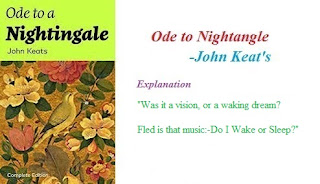
"Was it a vision, or a waking dream?
Fled is that music:-Do I Wake or Sleep?"
These two lines from the the concluding part of John Keats' romantic poem ode to a nightingale. Here, the poet expresses despair and bewilderment at the collapse of the visionary world built up with agonized imaginative effort.
The poet builds up a world of romance with each imagination while listening to the song of the nightingale. The sound of the very word 'forlorn' hurls him back home the world of imagination into the world of reality. In other words, it reverberates like death-knell, thereby suggesting the end of the poets romantic moment. The poet things that the immortal song of the bird(now transformed into a mournful dirge, i.e., plaintive anthem') gradually recedes and is finally lost irretrievably. Does the song perish because it is fundamentally unreal, or because the human mind is unable to sustain the imaginative reverie in which state alone the immortal song is audible? The query in the lone ("was it a vision or, waking dream?") underlines the poets divided heart and torturing perplexity. The question with which the poem ends ("do I wake or sleep?") shifts the focus from the visionary experience to the poet's present mental state. In a sense he has awakened from dream to reality, body shaking is growing at a heavy price as he can no longer responded to the enchanting music.
The poem ends on a note of ambivalence; the poem offers no definite answer. The poet is in a wavering state or the a state of dilemma i.e., he is caught between two opposite poles-that of reality and of romance. Accordingly, the central tension of the poem between the real and the ideal, the reality and the imagination, the mutability and the immutability remains unresolved. Uncertainly depends, and the opposing attitudes of the poet are left unreconciled in the final query.





0 Comments
Please do not enter any spam link in the comment box